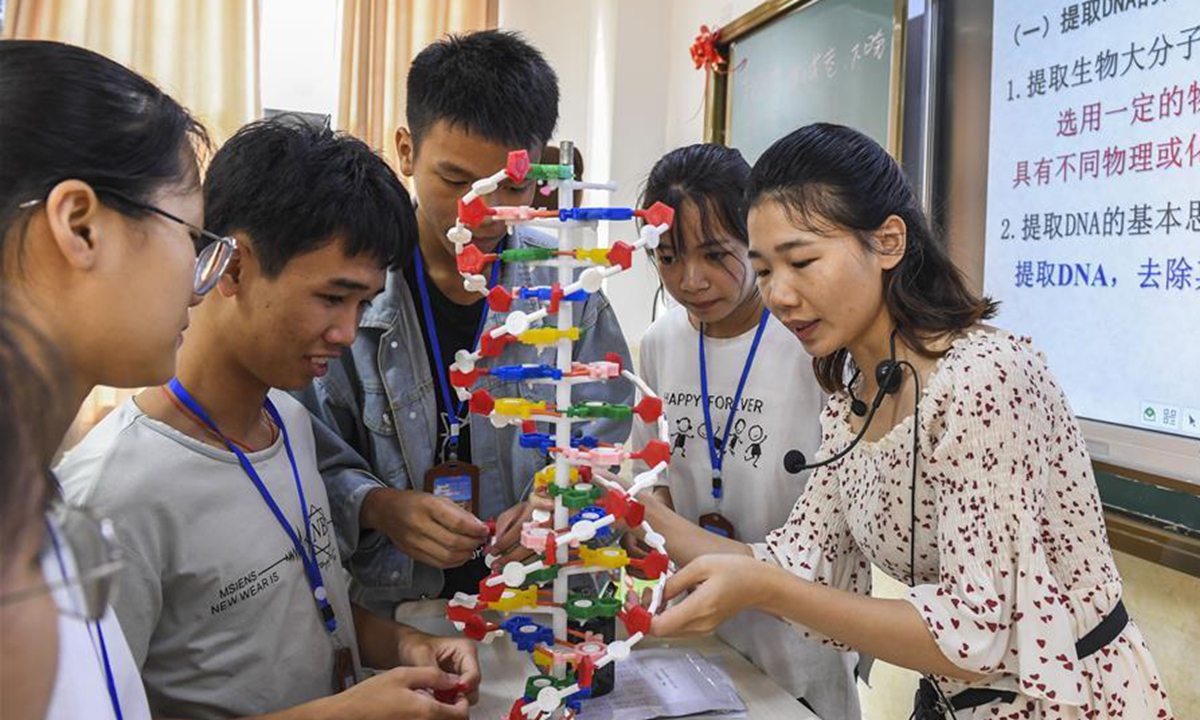New investigation into adolescents’ scientific research sparks controversy
By Xu Keyue Source: Global Times Published: 2020/7/16 23:01:22

A teacher and students study a DNA structure model at a middle school in Xingye County, south China's Guangxi Zhuang Autonomous Region, May 29, 2020.
After two national prize-winning works by teenagers were mired in controversy over suspected fraud, one more such work by two elementary students is also being investigated, which has attracted public criticism over the excessive pursuit of prizes among teenagers.
China Adolescents Science and Technology Innovation Contest (CASTIC) announced Wednesday that an investigation team has been set up to probe the case following suspicions that the research could have broken the rules of the contest.
CASTIC also vowed to further improve the competition review rules and procedures, strengthen the supervision mechanism and better guide and regulate young people to participate in the scientific and technological innovation practice.
An anonymous staff member of the local science museum who was responsible for the training for the contest told the Global Times on Thursday that the related authorities have launched an investigation in response to the controversy.
The announcement came after a third-grade student and a fifth-grade student in Wuhan, Central China's Hubei Province won third prize in a national level contest with their co-research work on an anti-tumor experimental study involving polyphenol from tea.
One photo featuring more than 20 mice in neat rows and another featuring mice tumors of different sizes were shown on the website.
According to the contest website, the experimental results showed that "green tea extract EGCG has a certain anti-tumor effect."
Netizens questioned how the kids dared to take the livers of the mice. Many said the experiments required rigorous logic, data processing and also strong medical support, questioning how such young children could finish the project.
It was not the first case of suspected fraud among prize-winning works by teenagers.
CASTIC on Thursday said that it had decided to cancel the prize award for a colorectal cancer-related gene study submitted by a primary school student after professional evaluation following suspicions that the child's parents helped him with the research.
Chen Yongbin, a researcher at the Kunming Institute of Zoology of the Chinese Academy of Sciences, also the father of the prize-winner, said in an apology on Wednesday that he had been overly involved in the compilation of the project.
A 2018 first prize in the contest's high school division held by CASTIC was also questioned over alleged partial duplication of a 2018 master's thesis from a medical university.
The prestigious annual contest attracts around 10 million young contestants nationwide every year.
The cases of suspected fraud in adolescents' scientific and technological research works have attracted public concern over the integrity and authenticity of such contests. There has also been criticism over the culture of excessive pursuit of prizes among teenagers.
A Beijing-based research fellow specializing in bioscience who requested anonymity told the Global Times that he was surprised when seeing some of the prize-winning works by teenagers in recent years as the projects usually require researchers with at least at a master's or doctoral degree.
He believed some of the projects couldn't be finished without professional assistance.
RELATED ARTICLES:
Posted in: SOCIETY